Today on Twitter, I saw a lot of quotes and images about the power of forgiveness in recovering from trauma.
It makes you feel “free.”
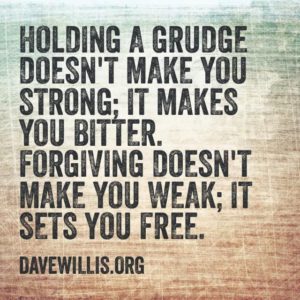
It gives you “peace.”
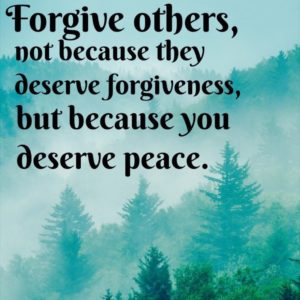
It makes you a “bigger person” to forgive someone for something they aren’t sorry for.
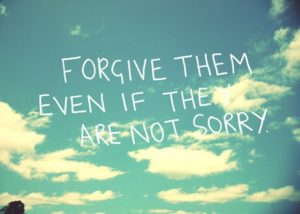
It helps you learn to love, too. Apparently.
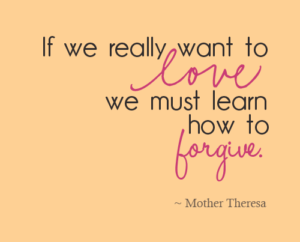
The issue that I take with this is that it’s a blanket statement. Blanket statements about recovery and wellness are something that we tend to criticize the medical model for, right? We say that not everyone responds to the same treatment and that therapeutic approaches should be tailored to the individual, not the diagnosis. We say that recovery should be multidimensional and sensitive to individual needs and wants.
So why is there a consistent push to glorify forgiveness as the end-all-be-all of being “really recovered” when it comes to trauma? Despite careful disclaimers that forgiveness is a personal decision and no one should be pushed into it, we don’t talk about people who have chosen not to forgive like we do people who have. Someone who forgives atrocity is considered strong, empowered, brave, recovered, and someone who conquered their trauma. Someone who doesn’t is resentful, stuck, bitter, and incomplete in their recovery. That’s a dangerous message to send, and here’s why.
Forgiveness is a detrimental process for some domestic violence survivors.
It minimizes abuse.
People who have been in abusive relationships can actually be harmed pretty seriously by feeling compelled to forgive. Forgiveness in this population is correlated with minimization of abuse[1], which is a serious obstacle that people face when recovering from domestic violence. Throughout the escalation of an abusive relationship, we often tell ourselves that if it gets to some specified point, we’ll leave. If he keeps drinking, I’ll leave. If he starts calling me names, I’ll leave. If he starts throwing things or punching walls, I’ll leave. If he hits me, I’ll leave. If he leaves marks, I’ll leave. If he breaks a bone, I’ll leave.
The problem is that, over time, people bond more and more to their abuser in a phenomenon called trauma bonding. The worse they get, the more bonded you become. So the goalpost shifts. Sure, I said I was going to leave at this point, but I love him more now than I did then so I can’t leave. After all, it wasn’t that bad. At least he didn’t do [new goalpost]. Making out forgiveness to be this ultimate sign of total recovery gets victims back into that minimization mindset that was so dangerous for them.
It correlates with returning to the abuser.
If I forgive my abuser, what’s keeping me away from him? If I decide that I’m no longer going to feel hurt by what he did, all I’m left with is the good parts that kept me in the relationship. If I’m not angry anymore about his behavior, was the behavior that bad in the first place?
Forgiveness is the number one predictor of a person’s decision to return to their abuser[2]. Above their demographic characteristics, the severity of violence experience, how the victim attributes blame for the violence, and level of investment in the relationship, forgiveness beats them all. Can we conclude then that urging victims, whether actively or passively through cultural dialogue, to grant forgiveness is one of the more dangerous things you can do? I think we can. After all, survivors of domestic violence are very, very practiced in forgiveness. We do it over and over and over again. Perhaps part of leaving and making change means refusing to forgive anymore. That doesn’t make us bitter.
It encourages offenders to keep escalating.
Forgiveness is one of those words that has a very different literal meaning than it does a common meaning. Definitions of forgiveness usually say that it means letting go of resentment, choosing to no longer be hurt by an offense, or moving on from pain. Of course, as described above, those are problems to begin with. The commonly accepted cultural meaning of forgiveness is that the offender is absolved of their behavior and everything is okay. That’s a problem too.
People who perpetrate psychological and physical aggression in marriage tend to escalate that behavior when forgiven of it and reduce that behavior when not forgiven[3]. Forgiveness sends the message that it wasn’t that bad and more abuse is tolerable. It tells the offender that their victim is willing to accept aggression. What offenders need in order to stop is to be told that their behavior is absolutely intolerable. Encouraging victims to forgive undermines that process.
It endangers the well-being of victims.
After all of that, we still have to confront this idea that forgiveness has psychological benefits. For a lot of experiences, that’s true. Willingness to forgive is a sign of psychological health, self-assuredness, acceptance, and protects against depression. However, when it comes to domestic violence, forgiveness is associated with loss of self-respect and self-concept[4].
Here’s why I think that is. Abuse is an inherent attack on your self-concept and ability to respect yourself. At first, things that are your weaknesses are magnified and become the worst things in your abuser’s life. You might have started out feeling a bit bad about how cluttered you are, but over time, it becomes the absolute worst thing that has ever happened to your abuser. And that feels like your fault, which undermines your self-respect.
Then, things that were your strengths suddenly become your weaknesses. What you used to feel proud of are now things that bring you pain. Your intelligence is mocked and used against you. Your empathy is regarded as emotional weakness. Your hard work is selfishness. This completely erodes your self-concept.
When I think about forgiving my abuser, it implies to me that I share some blame and that some things were correct. They aren’t. Being cluttered is not the end of the world. I’m not being selfish by working hard. But if I say, “I forgive you for saying that,” I’m implying that there is a kernel of truth, even if exaggerated. It validates those attacks on my soul as warranted, which completely erodes the self-concept I have carefully reconstructed since I left.
Why is this a feature of our culture?
To finish this off, I want to talk a little bit about why I think the concept of forgiveness has become such a huge feature in our culture. I mean, honestly, I cannot get through a week without a Facebook video popping up about someone rising above and forgiving someone that committed an atrocity. And good for them, really. I’m happy that they felt comfortable doing that.
But I think we glorify forgiveness not because it is a sign of mental and emotional strength or resilience, but because we live in a victim-blaming culture. Most of us are familiar with victim-blaming attitudes like it being your responsibility to dress in a way that doesn’t attract rapists, or it being your responsibility to risk your life to get away from someone instead of letting victimization happen out of self-protection. We don’t talk about this idea that it’s is also the victim’s responsibility to impart forgiveness and absolution onto perpetrators to make things right. But we should, because that is not their job.
What can we do moving forward?
I think the recovery community would do well to confront this idea that forgiveness is the ribbon at the finish line of recovering from trauma. We are quick to call out other forms of victim-blaming, but not this one. We as recovery advocates can make that change. When I see someone glorifying forgiveness as the mark of a true RecoveredPerson, I’m going to let them know that forgiveness is harmful for a lot of survivors of intimate partner violence and I encourage you to do the same.
Let’s start by confronting those images up there.
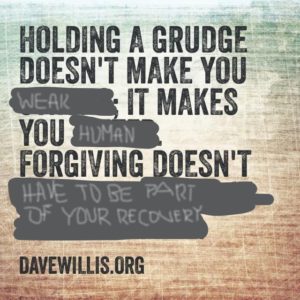


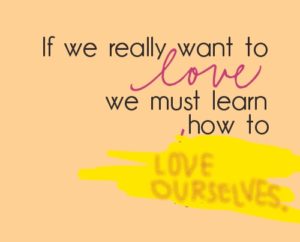
[1] Gilbert, S.E.; Gordon, K.C. (2016). “Predicting forgiveness in women experiencing intimate partner violence.” Violence Against Women 23(4), pp. 452-468
[2] Coop, K.G.; Burton, S.; Porter, L. (2004). “Predicting the intentions of women in domestic violence shelters to return to partners: Does forgiveness play a role?” Journal of Family Psychology 18(2), pp. 331-338
[3] McNulty, J.K. (2011). “The dark side of forgiveness: The tendency to forgive predicts continued psychological and physical aggression in marriage.” Personality and Social Psychology Bulletin, 37(6), pp. 770-783
[4] Luchies, L.B.; Finkle, E.J.; McNulty, J.K.; Kumashiro, M. (2010). “The doormat effect: When forgiving erodes self-respect and self-concept clarity.” Journal of Personality and Social Psychology, 98(5), pp. 734-749
